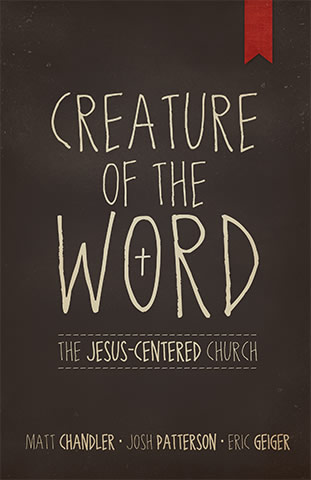An Interview With Josh Patterson at The Village Church
On Thanksgiving morning 2009, life changed for Pastor Matt Chandler. Life and perspective also changed for the church he pastored, The Village Church in Flower Mound, Texas.
Matt suffered a seizure in his home and was diagnosed with a malignant brain tumor. The first reaction of the church’s leadership and congregation was the right one: to pray and fast for healing. Over time, leadership began to think about what was next for the church. Their primary communicator to the thousands of people gathered in services each week wasn’t going to be teaching anytime soon–and perhaps, never again.
Recently, I had the privilege of interviewing Josh Patterson, Lead Pastor over Ministry Leadership at The Village Church, who’s served on staff alongside Matt since 2004 and been integral to God’s work there. He’s also co-author of Creature of the Word, in which he effectively lays out the “Scripture-based beauty of a Jesus-centered church.”
Check out how this church dealt with their pastor’s sickness and planned for an uncertain future.
An Interview with Josh (my questions are in bold)
Did The Village have a succession plan in place when Matt got the news on his cancer?
No, we did not have a formal succession plan in place. But we did, by God’s grace, have the right team in place to lead the church through that particular season and through any potential succession. Although burdened and shocked with the reality before us, we felt prepared to walk through it even without a detailed plan in place. Principally, we had invested more in having the right leadership team in place rather than a specific plan.
How has Matt’s diagnosis caused your church to think differently about having a succession plan?
The week of Matt’s surgery we gathered as a staff to pray and process. We were shell-shocked with the news and heavy with sadness. A staff member asked us if we had a plan in place should Matt not be able to return to the pastorate. We answered honestly, “No, we don’t have a plan, and we don’t sense now is the right time to make a plan, but we do believe the Lord has assembled and prepared the right team to lead through this. If it becomes apparent that we need to make a detailed plan, then we will.”
Succession varies by context and situation. Some churches face the reality of an aging pastor, while others are confronted by daunting diagnoses. Each situation necessitates nuances and contextual decisions. Ultimately, succession is about change, and any change, whether foreseen or not, requires healthy leadership to navigate it appropriately.
The lessons we learned and the principles that continue to serve us today revolve around having the right leaders in place to navigate change. We have had a shared leadership culture with a strong plurality of voices and influences at The Village, which continues to be a blessing for the staff and church body.
Do you think churches should consider key man insurance on lead pastors?
Yes, this is something a church should consider for risk mitigation. Although it may not be the right decision for a particular church, walking through the process to make an informed decision is good and healthy.
At The Village we felt it was prudent to carry key man insurance and have had policies in place for years. In the same way that we maintain reserve cash funds, certain types of insurance are in place to help the church endure various storms.
What are some practical tips for churches to not be solely dependent on one communicator?
The most obvious tip would be to share the communication platform. In order to develop and multiply leaders, they must be given opportunities to grow. What a privilege it is to pull others onto the stage and affirm them before the church. This process cultivates and strengthens a culture of shared voices.
There is nothing wrong with having a primary voice and communicator in the life of a church, but the primary voice should be a champion for the other voices in the church. Other voices shouldn’t be seen as a threat but a blessing.
I mentioned earlier the value we hold for shared leadership at The Village. We have found that this type of environment raises the overall waterline of leadership. Although we have a primary communicator in terms of preaching, we have several leaders with substantial influence throughout the staff and church body. By God’s grace, we take a genuine team approach.
What is celebrated is cultivated. If the church and leadership celebrate a plurality of voices and influencers, then a culture of plurality will be cultivated.
What strategically needs to happen for churches to have a mindset that any leader may be gone?
Preach it. Teach it. Talk about it. Point it out. Call the church to live in light of it. This should be a common conversation in the course of church life. Scripture makes the point clear: “yet you do not know what tomorrow will bring. What is your life? For you are a mist that appears for a little time and then vanishes. Instead you ought to say, ‘If the Lord wills, we will live and do this or that” (James 4:14-15). There are dozens of other texts that affirm the same reality: Life is short, and we are not in control.
Scripture proclaim this truth, and our experiences confirm it. Accidents happen. Tragedy strikes. Circumstances change. This is true for everyone, not just the leader.
We have a strong gospel opportunity to talk about the anchor of our hope and our life and our church. Our anchor is not any person, the church itself or any particular circumstance.
The Church should preach this message with candor, conviction and utter joy. Not only is the Lord Jesus going to build His Church, He will ensure that His Church will persevere to the end.
What do you feel is the strength of ministers having the mindset of being dispensable?
A graveyard is a good reminder that all of us are replaceable and dispensable. The only One who isn’t replaceable isn’t in the grave. Recognizing the reality that we are not essential yet invited to be a part of what God is doing in the kingdom produces freedom, joy and humility.
A few years ago, The Village graciously gave me a sabbatical. The time afforded me some incredible clarity in certain areas of importance and identity. First, I am not the Messiah, so I can stop trying to live like one. Also, my identity is not The Village Church. One of the greatest joys of my life is serving as a pastor at The Village, but this is a role the Spirit has given me and does not constitute my fundamental identity.
These truths wash over my heart in really healthy ways. They rattle my pride and develop humility. They free me from a posture of trying to be something or someone I am not. There is more room in my heart for joy and gratitude. Even more, I can celebrate the gifts of God in others. The biblical paradox we all have to embrace is that pastoring, leading and living from a position of weakness is the only time we are ever truly strong (2 Corinthians 12:10).
Check out Josh’s book, The Creature of the Word.
You can follow Josh on Twitter @PattersonJosh



